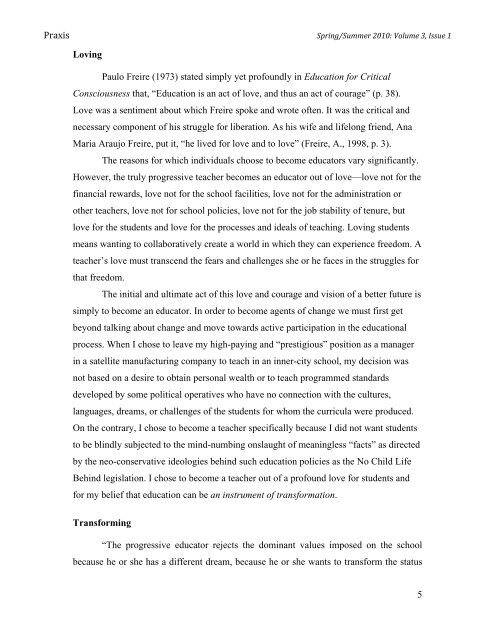PRAXIS - Paulo Freire Institute
PRAXIS - Paulo Freire Institute
PRAXIS - Paulo Freire Institute
- No tags were found...
Create successful ePaper yourself
Turn your PDF publications into a flip-book with our unique Google optimized e-Paper software.
Praxis Spring/Summer 2010: Volume 3, Issue 1<br />
Loving<br />
<strong>Paulo</strong> <strong>Freire</strong> (1973) stated simply yet profoundly in Education for Critical<br />
Consciousness that, “Education is an act of love, and thus an act of courage” (p. 38).<br />
Love was a sentiment about which <strong>Freire</strong> spoke and wrote often. It was the critical and<br />
necessary component of his struggle for liberation. As his wife and lifelong friend, Ana<br />
Maria Araujo <strong>Freire</strong>, put it, “he lived for love and to love” (<strong>Freire</strong>, A., 1998, p. 3).<br />
The reasons for which individuals choose to become educators vary significantly.<br />
However, the truly progressive teacher becomes an educator out of love—love not for the<br />
financial rewards, love not for the school facilities, love not for the administration or<br />
other teachers, love not for school policies, love not for the job stability of tenure, but<br />
love for the students and love for the processes and ideals of teaching. Loving students<br />
means wanting to collaboratively create a world in which they can experience freedom. A<br />
teacher’s love must transcend the fears and challenges she or he faces in the struggles for<br />
that freedom.<br />
The initial and ultimate act of this love and courage and vision of a better future is<br />
simply to become an educator. In order to become agents of change we must first get<br />
beyond talking about change and move towards active participation in the educational<br />
process. When I chose to leave my high-paying and “prestigious” position as a manager<br />
in a satellite manufacturing company to teach in an inner-city school, my decision was<br />
not based on a desire to obtain personal wealth or to teach programmed standards<br />
developed by some political operatives who have no connection with the cultures,<br />
languages, dreams, or challenges of the students for whom the curricula were produced.<br />
On the contrary, I chose to become a teacher specifically because I did not want students<br />
to be blindly subjected to the mind-numbing onslaught of meaningless “facts” as directed<br />
by the neo-conservative ideologies behind such education policies as the No Child Life<br />
Behind legislation. I chose to become a teacher out of a profound love for students and<br />
for my belief that education can be an instrument of transformation.<br />
Transforming<br />
“The progressive educator rejects the dominant values imposed on the school<br />
because he or she has a different dream, because he or she wants to transform the status<br />
5


